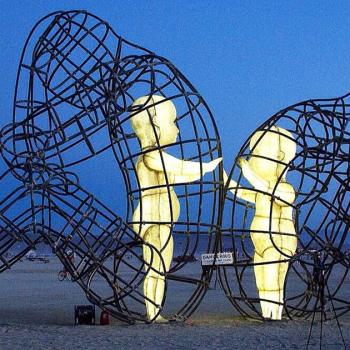When it comes down to it, will Evangelicals vote for a Mormon for president? There has been a flurry of survey data and discussion about it among commentators. A recent survey by the Pew Research Center shows white evangelicals increasing in their support for Romney, rising from 69 to 74 percent. Commentators have argued that while Romney was opposed in the past by some evangelicals due to his "cultic religion," in reality according to folks like Jonathan Merritt, "Romney never had a serious evangelical problem." Conservative Evangelical leaders like Richard Land also assure us that we need not worry about Romney's religion, and that the biggest concerns during the primaries had to do with whether or not Romney was conservative enough on social issues. And with some of the most hostile critics of Mormonism apparently reconciling their aversion to the religion with a possible vote for Romney, including those known for confrontational approaches to Mormons and linked to the film trailer that allegedly sparked the uprisings in the Muslim world, it would appear that Evangelicals have turned a corner on Mormonism, and religion in the public square.
Or have we? In my view, although the recent polling data reflects the way in which a segment of Evangelicals are responding to survey takers, it does not accurately reflect the way in which some Evangelicals will act in the voting both, or at home as they choose to sit out this election cycle given the Republican candidate. As an Evangelical who has spent many years in this subculture, and who has seen its attitudes and perceptions of Mormons and other minority religions, there are reasons to believe that Romney may indeed lose precious votes from Evangelicals because of his religion in what will surely be a close election.
For many evangelicals Mormonism is a cult, a heretical and deviant religion in belief and practice. This view was articulated most clearly by Pastor Robert Jeffress. From this view Mormonism is to be resisted as a false religion. Although new perspectives are gaining momentum in Evangelical circles that approach Mormonism as a religious culture rather than as a cult, the "counter-cult" approach is still very influential. This approach has so shaped Evangelical perceptions of Mormonism that some Evangelicals fear worldwide Mormon domination launched from the White House. According to this view, if a Mormon were to win the presidency it would provide a sense of legitimacy to the religion, and serve as a platform for the spread of the religion worldwide. In the face of this potentiality, for many Evangelicals a Mormon president is a theological and political impossibility.
In addition to concerns about Mormonism, many Evangelicals are also deeply suspicious of other religions being involved in America's political process. An indication of this was provided through Janet Mefferd, host of a syndicated radio program that includes her name, and which is carried by 110 affiliates across the nation. Mefferd's program reaches a large Evangelical audience, and frequently touches on issues related to religion, politics, and world affairs.
In one program Mefferd took exception to the bold move of the Republican Party during their National Convention in August when it invited the President of the Sikh Society of Central Florida to provide the prayer of invocation for the gathering. Ishwar Singh, the invited Sikh dignitary, stated in connection with the opportunity, "I hope that my presence . . . on the national stage will play a small part in helping Sikhs—and people of all races, faiths and orientations—be seen as part of a great American family." But Mefferd's feelings related to Mr. Singh's presence were decidedly different.
"And look how far we've come. Now, 2012 we have somebody from an Eastern religion offering the invocation at the Republican National Convention. I'm not saying people from different religions can't vote Republican, but what this really is, is a syncretism that is kind of seeping under the door like a gas." (emphasis mine)




